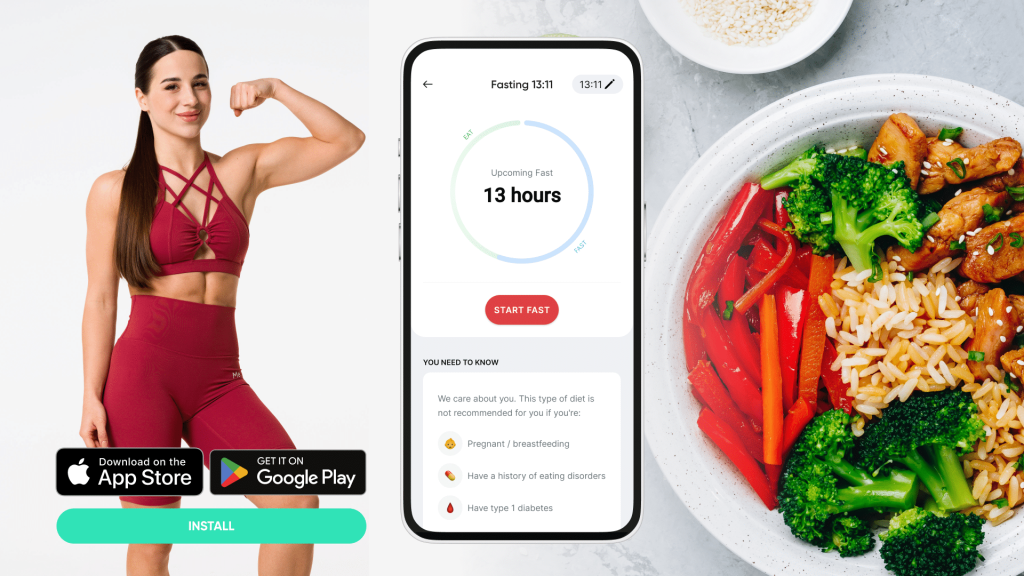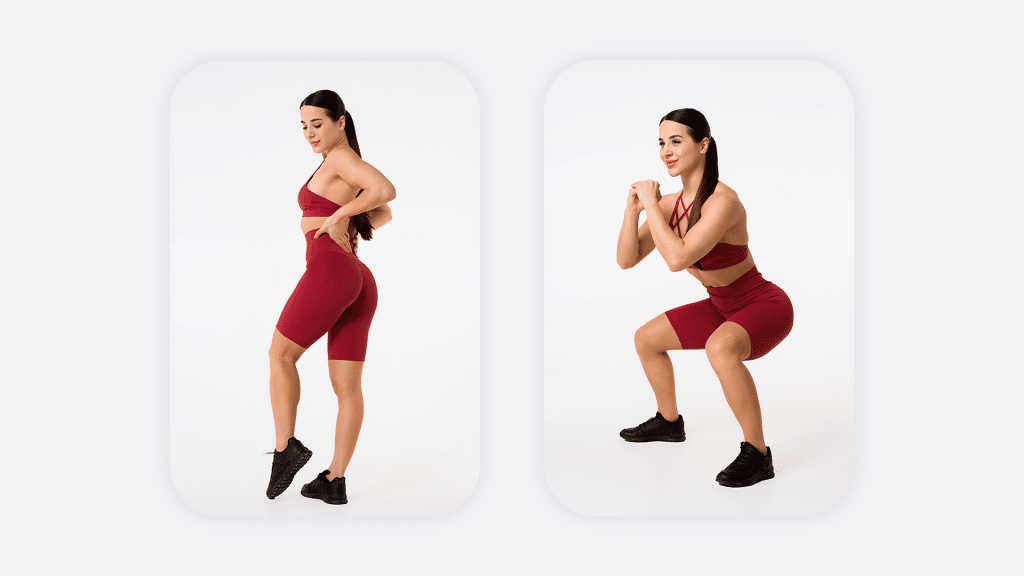Nowadays, there are huge varieties of methods that can help you to lose, gain or maintain your weight. The internet, media, and healthcare professionals from the world of weight loss offer tons of dietary and workout plans that can satisfy your fitness goals. However, diet and exercising can have significant positive and negative effects for your health. That is why it is so vital to check out all the necessary information before making such changes in your life.
There are lots of fad diets that can harm your health, so you should be careful and make sure that a nutritional plan that you are going to follow will provide you with all the essential nutrients and an adequate caloric deficit. You don’t want a rapid and unsustainable weight loss. Instead, go for diets that are supported by health experts and backed up by evidence. In this article you will find out all the details about the 30-day fast weight loss. Below you can find an informative guide about fasting, its types and their effects on your body. Let’s start!
What Is Fasting And What Types Are The Most Popular?
Although weight loss is often associated with diets that restrict the number of calories you consume or limit certain foods, there also are other weight loss methods that can regulate your eating habits. For example, a 30-day fast weight loss. But what exactly is fasting? Fasting is a dietary pattern that is gaining popularity among a growing amount of people. This is a method of restricting food intake and it has several variations. There are two of the most popular types of fasting:
- Water fasting
- Intermittent fasting
Below you can check detailed information about these types of fasting and which one is better for your body and weight loss in particular. Read on!
30-Day Fast Weight Loss: Water Fasting
First, water fasting. The rules are simple but strict. While on this type of fast, dieters cannot consume anything except water. People believe that they should stick to a water fast for numerous reasons: – weight loss, multiple health benefits, religious reasons and more. But the main goals are to improve health status and peel off unwanted pounds. This sort of fasting is quite popular due to its rapid and impressive effects.
Water Fasting Health Benefits
According to several research findings, water fasting could offer a number of health benefits. For instance, it may decrease your risks of some chronic illnesses and stimulate the process of autophagy. Autophagy is a process in which your body cells clean out damaged or unnecessary parts (4). Studies have shown that it could help to protect your body from heart and Alzheimer’s diseases (1, 5). According to other research, it could prevent the accumulation of damaged parts of your body’s cells and in this way prevent the development of cancer cells (13). This process could also prolong your life expectancy (3, 6, 12). All these studies were conducted on animals however, so this question still lacks results from human studies.
According to the research, a prolonged water fast (10-14 days) could also lower your blood pressure (9, 10). Medical supervision is mandatory in this case. There is no similar evidence concerning the link between short-term fasting and blood pressure.
Keep in mind that you can get the majority of health benefits by simply sticking to short-term fasting. Long-term ones can be dangerous for your health and life.
Read More: How Much Water Should I Drink While Fasting: Estimating Your Fluid Needs
Water Fasting: Is It Safe?
It is noteworthy that thoughts concerning safety of this weight loss method are quite controversial. Despite all the benefits, water fasting needs more scientific background, especially – human studies. This dietary pattern is over-restrictive and for this reason isn’t suitable for everyone. The main issue is that your body still needs nutrients to function properly and stay healthy. That is why even if water fasting might offer health benefits, it still brings an increased number of risks as well.
Because of such a severe calorie restriction, you may lose weight too fast, and that is quite harmful to your health. For instance, rapid weight loss can cause gallstones, malnutrition, hair loss, muscle loss, headaches and more (11). You may shed up to 2 pounds (0.9 kg) per day of 24-72-hour water fast. In fact, it is recommended to not lose more than 1-2 pounds of body weight per week, not per day (14).
Betterme will keep you laser-focused on your weight loss journey! Nutrient-packed meal plans, fat-blasting workouts, galvanizing challenges and much more. Try using the app and see for yourself!
Water Fasting And Dehydration
Maybe it sounds weird, but you may also face such a consequence as dehydration. The point is that the foods you consume provide you with approximately 20-30 % of your daily water intake. By drinking the same amount of water but avoiding foods, your body won’t get necessary hydration. As a result, you may experience low blood pressure, headaches, dizziness and other symptoms of dehydration.
Water fasting is especially dangerous for people with certain health conditions, including eating disorders, diabetes and gout.
What Is The Optimal Term Of Your Water Fasting?
And what about the optimal term of your water fasting? Yes, many people have practiced the 30-day fast weight loss approach, drinking only water and avoiding food at all. Some dieters start with a 5-14-day water fasting to prepare their bodies for this stress. Others stick to this diet for 22 and even 40 days at once– everything depends on their goals. Technically, this is possible. Some people even claim that when the body doesn’t have to spend energy for digestion, they have more energy for other things. Many of them claim even being able to continue their normal life – go to work and have regular training sessions.
Your body can deal with only-water-diet-plan for a month, but it is extremely dangerous. Everything depends on your overall health, possible medical conditions and the amount of body fat you have. As it was mentioned above, this dietary pattern is not for everyone. If your aim is only to lose weight quickly, it also has one major minus. In the majority of cases, after such crazy and over-restrictive diets, people tend to regain their weight. And that is in addition to all the risks for your health, listed above.
However, there are short-term water fasts that aren’t dangerous for your body. Because of all the risks, health professionals don’t recommend fasting for a period longer than 1-3 days. Remember that it is dangerous to stick to this dietary pattern for a longer period without medical supervision.
How To Stick To A Water Fast?
There are no special guides about how to fast properly. Most dieters drink approximately 2-3 liters of water per day during their fasting. Some people may feel dizzy and experience fatigue. For this reason, it is better to avoid driving, physical activity and operating heavy machinery. Some dieters drink only water, others allow themselves herbal teas, lemon water and other beverages.
It is important to break the fast correctly. It is crucial to re-introduce food into your meal plan carefully and gradually. Don’t eat a big meal immediately after the end of your diet. It is better to start with small and healthy meals or smoothies, the things that will affect your digestive system more gently. Increase your portion size throughout the day. After you get used to food again, you can safely go back to your normal diet. This post-fast period can take 1-3 days. In order to avoid gastrointestinal distress when breaking a water fast your menu during the post-fast period should include the following foods:
-
Apple Cider Vinegar And Lemon
Although apple cider vinegar itself won’t help boost your digestion, it can reintroduce acid back into your gut. The same goes for a citric acid found in lemon, which besides that can promote the production of gastric juices. The fiber from lemon, when ingested can act as a prebiotic. Consumption of apple cider vinegar with lemon juice and warm water can help your gut prepare for the following food digestion.
-
Soup, Bone Broth, Or Kefir
Now that you are reintroducing prebiotics into your system, it is time to start with some electrolyte-laden liquids. Some of the best options are bone broth and soup. If you start your meal with the above-mentioned apple cider and lemon water, then wait a couple of minutes before moving on to broth or kefir. You can check if your body is ready for some solid foods, or if you need to stick with liquid foods a bit longer.
-
Probiotic Foods
Once you feel like your body is ready to process solid food after a water fast, you need to make sure that you have a healthy gut bacteria balance. To promote optimal digestive health your menu should include foods packed with probiotics. Sauerkraut, kimchi, and fermented vegetables are filled with probiotics. Avocados can help produce lipoates to help break down fat during digestion. Pineapples contain bromelain, which is an enzyme that assists in protein absorption. You can have them as a snack, as a topping, or as a salad ingredient.
If you still want to water fast longer, it is critical to consult your healthcare provider before making such serious steps and changing your usual lifestyle.
30-Day Fast Weight Loss: Some Tips For Your Success In Water Fasting
Below you can find a list of small and simple recommendations, that will help you to achieve your fitness goal during your fasting.
-
Set Your Goals
Before starting any diet, it is critical to set goals (realistic ones). This case is not an exception. You should decide for how long you want to stick to this diet. It is also important to know what you want to achieve – weight loss, better overall health or something else. These small steps will help you to manage fasting and be satisfied with your results. Before initiating a water fast, it is tremendous to understand what challenges you are about to face and the potential consequences and risks.
Read More: Realistic Weight Loss Goals: A Reality Check You Need
-
Don’t Pay Attention To Other People’s Opinions
Your motivation, enthusiasm and desire to stick to this diet may be ruined by people around you. Your family members, colleagues, and friends, who take care for you, may try to stop you from sticking to such a diet. They are most likely afraid of possible consequences to your health. But if you are closely monitored by your doctor or dietitian everything should be fine. You can stick to your own opinion. Just remember to listen to your body and make your health the number one priority.
-
Monitor
It is critical to listen to your body and pay attention to its reaction to your new nutrition regime. If you feel bad and understand that fasting is too tough for you, it is better to try other diets that will be more balanced and healthy. It is also important to monitor your progress. For example, you can make photos or weigh yourself regularly. In this way you’ll see your first results and stay motivated.
-
Prepare Your Body
If you are fasting for the first time, it is especially important to prepare your body for this dietary pattern. For example, during 3-4 days before fasting you can start decreasing your portion sizes or restrict your sugar and carbs intake. Some dieters also fast for part of the day.
-
Establish Your Own Rules
It was mentioned above that people tend to have some variation of water fasting. They allow themselves herbal teas and some other drinks that don’t harm the digestive system during the diet. It means that you can slightly change your fasting rules to make everything more suitable for you.
If you want to lose weight and get long-term results without damage to your health, it is better to choose more gentle types of fasting. Intermittent fasting will be perfect for this purpose.
Intense sweat sessions, working weight loss tips, lip-smacking recipes come in one package with the BetterMe app. And all of it is at your fingertips, start transforming your life now!
30-Day Fast Weight Loss: A Short Guide To Intermittent Fasting
Now, while water fasting promises weight loss, it bears such risks as malnutrition, hair and muscle loss, headaches etc. So, why resort to such a risky weight loss plan if there is a healthier way of fasting, which can reward you with a much more sustainable result? Intermittent fasting is a much better way to achieve your fitness goal. It is more flexible and safe, so you can choose the most suitable schedule and slim down without being afraid for your health. That is why this is one of the most popular dietary plans for weight loss and health in general.
Basically intermittent fasting is an eating pattern, in which the fasting and eating periods of time follow each other. You can eat all healthy foods, there is no special food list for this diet. The focus is more on when you eat instead of what you eat.
30-Day Fast Weight Loss: Different Intermittent Fasting Approaches
There are several intermittent fasting approaches that are the most popular among the dieters. Some weight-watchers prefer the 5:2 method – they stick to a normal diet for 5 days a week and fast for 2 days. During 2 fasting days they can consume only 500-600 calories per day (or ¼ of your usual calorie intake). Others prefer a different approach, like when they fast for 24 hours several times a week.
The 16/8 method is probably the most popular. Its followers have their major meals (as a rule, lunch and dinner) during an 8-hour window and fast for the rest of the day. It is considered to be the simplest, as you sleep at night and just skip breakfast. Sometimes this approach is subdivided for men and women: men fast for 16 hours and women – 14. There is also a similar 18/6 method, where you should consume all your calories during a 6-hour eating window and fast for the rest of 18 hours. And probably the easiest one is 12/12 fasting, where you have half of the day to eat and the other half to fast.
Due to an automatic reduction of your daily calorie intake, this eating pattern effectively helps to trim off unwanted pounds. It also offers you a number of health benefits. For instance, some studies have shown that intermittent fasting could have an impact on inflammation reduction, which is one of the main causes of chronic diseases (2, 7). This eating pattern also may support your brain function, prevent cancer, increase life expectancy and more.
30-Day Fast Weight Loss: The Effect Of Intermittent Fasting On Your Health
However, the effect of intermittent fasting on your health still needs more scientific backing. It isn’t suitable for people who have/had eating disorders or are underweight. Pregnant or breastfeeding women, people with low blood pressure and diabetes should also avoid this diet. The followers of intermittent fasting can also face a number of side effects – fatigue, irritability, headaches, bloating and more. As you can see, this diet is also not for everyone, and you should consult professionals before starting it.
How To Start Your 30-Day Fast Weight Loss With Intermittent Fasting?
There are no special and strict rules. You can create your own dietary pattern. For instance, you can start your fasting by sticking to the approach which is simpler for you. You can follow the 16/8 (or 14/10) method for the first two weeks of your diet and change it to 5:2 for the last two weeks. Maybe for you it will be easier to make it vice versa, everything is up to you.
If you feel you have enough energy, you can include some light training sessions to your schedule even on fasting days. As it was mentioned above, it is important to break the fast correctly. You can choose some healthy meals and start from smaller portions. Meals high in protein and healthy fats will be perfect (it is better to avoid carbs). Eggs, nuts, or oatmeal will be perfect in this case.
Remember that when it comes to dieting and weight loss, everything is quite individual. Listen to your body and choose methods and tools that are more effective and suitable for you.
Some Tips For Your Success In Intermittent Fasting
Plan
Planning your meals will significantly simplify your diet. It is especially important to plan your non-eating days, when you have to consume only about 500 calories of healthy food. Remember, that even on your non-fasting days it is important to consume healthy and nutritious foods. When planning a meal, make sure that it includes plenty of vital nutrients, such as:
Lean Proteins
Proteins are building blocks of your body. They are a crucial part of a weight loss plan since they help you maintain and grow muscle mass, which boosts your metabolism, meaning that you burn more calories even while at rest. Proteins also prolong your feeling of fullness, which is especially beneficial for those who decided to try intermittent fasting. Some great sources of protein include lean meats, eggs, dairy, beans and legumes, and nuts.
Complex Carbs
Every macronutrient is essential for your body and crabs, despite their bad rap, are no different. However, it is important to know which type of carbs to consume. Complex carbohydrates can prolong the feeling of fullness and improve your digestion. You can find plenty of complex carbs in whole grains, beans and legumes, fruits, vegetables, nuts, and seeds.
Unsaturated Fats
Not all fats are evil. There are two main types of fat – healthy and unhealthy. Unhealthy fats, such as trans and saturated fats, increase the risk of cardiovascular disease, obesity, and diabetes – these should be avoided at all costs. Your daily intake of unhealthy fats should be less than 10% of your total daily caloric intake. Healthy fats, on the contrary, are beneficial to your body. They promote satiety and reduce the risk of chronic diseases. Healthy fats include poly- and monounsaturated fats. They are essential for the proper functioning of your body. You can find plenty of healthy fats in fatty fish, avocados, olives, nuts, and seeds.
Vitamins And Minerals
Micronutrients are as vital for your health as macronutrients. Various vitamins and minerals can be found in all types of food. The best sources of micronutrients for your diet are fruits and vegetables since they are also rich in fiber and water, which makes them filling while being low in calories. Other rich sources of vitamins and minerals include dairy, beans and legumes, nuts and seeds, fish, organ meats, and others. You need to ensure that you meet your daily micronutrient requirement if you wish to be healthy.
Since there is no calorie restriction for a 16/8, 18/6, and 12/12 intermittent fasting, you technically can eat whatever amounts of food you want. However, if your goal is to drop some weight, you need to create a calorie deficit. To do so, you need to calculate your calorie needs and extract 500 or 1000 from your daily calorie requirement. First, calculate your basal metabolic rate (BMR), which is the number of calories your body burns to maintain proper body functioning. You can use the following formula:
- Your BMR if you are a woman = 10 × your weight in kg + 6.25 × your height in cm – 5 × your age in years – 161
- Your BMR if you are a man = 10 × your weight in kg + 6.25 × your height in cm – 5 × your age in years + 5
Now to calculate your daily caloric requirements (a number of calories you need to consume each day to maintain your current weight) multiply your BMR by your physical activity level, which is:
Sedentary or light activity lifestyle: 1.40 – 1.69
Active or moderately active lifestyle: 1.70 – 1.99
Vigorous or vigorously active lifestyle: 2.00 – 2.40
Having calculated your daily caloric requirements you can create a meal plan with an adequate caloric deficit, which will lead to an inevitable healthy and sustainable weight loss.
-
Experiment
As it was mentioned above, everything in dieting is quite individual. If you want to find your perfect approach, it is important to experiment. You can try all the intermittent fasting methods to find the most suitable one. You can also take your time to find foods, that will be the best for you and will provide you with energy.
-
Avoid Refined Grains And Sugars
It will be better to replace these foods with fresh fruits and veggies, whole grains, lentils, beans, lean proteins, and healthy fats. They will be the best option for your diet and will provide you with all the necessary nutrients (8).
-
Drink Water
You already know about the importance of hydration for your weight loss and overall health. That’s why keep in mind to drink necessary amounts of water both on your fasting and eating days. To be in good health, it is recommended that adult humans drink 8 glasses of 250 ml of water per day, i.e. 2 liters per day.
FAQs
What Type Of Fasting To Choose?
It was mentioned above that long term water fasting is dangerous for your health. That’s why if you have decided to try fasting, it is better to choose either one or two day of water fasting or intermittent fasting. Intermittent fasting will be a safer and more reliable way to lose weight and support your health. In any case, it is always better to consult a professional nutritionist in order to avoid unwanted consequences for your health.
Can I Take Supplements During Fast?
If you stick to a longer fast, you may face nutrient deficiency. That’s why adding supplements to your daily routine is recommended. But you should know which ones are better and which ones should be taken with foods. Again, consult your doctor or dietitian to find out the most suitable supplements.
Conclusion
In conclusion, as you can see, 30-day fast weight loss isn’t the simplest or healthiest way to shed unwanted pounds. There are many nuances, and it is highly important to be careful. Remember that your body has its nutritional needs for proper functioning. It needs nutrients to stay healthy and attractive. That is why it is vital to maintain a healthy and well-balanced diet that will provide you with all necessary vitamins, minerals, and antioxidants. Take care of your health and appreciate yourself.
DISCLAIMER:
This article is intended for general informational purposes only and does not serve to address individual circumstances. It is not a substitute for professional advice or help and should not be relied on for making any kind of decision-making. Any action taken as a direct or indirect result of the information in this article is entirely at your own risk and is your sole responsibility.
BetterMe, its content staff, and its medical advisors accept no responsibility for inaccuracies, errors, misstatements, inconsistencies, or omissions and specifically disclaim any liability, loss or risk, personal, professional or otherwise, which may be incurred as a consequence, directly or indirectly, of the use and/or application of any content.
You should always seek the advice of your physician or other qualified health provider with any questions you may have regarding a medical condition or your specific situation. Never disregard professional medical advice or delay seeking it because of BetterMe content. If you suspect or think you may have a medical emergency, call your doctor.
SOURCES:
- Aging and Autophagy in the Heart (2016, ahajournals.org)
- Alternate Day Calorie Restriction Improves Clinical Findings and Reduces Markers of Oxidative Stress and Inflammation in Overweight Adults With Moderate Asthma (2007, pubmed.ncbi.nlm.nih.gov)
- A periodic diet that mimics fasting promotes multi-system regeneration, enhanced cognitive performance and healthspan (2016, ncbi.nlm.nih.gov)
- Autophagy: Everything you need to know (2020, medicalnewstoday.com)
- Autophagy in Alzheimer’s Disease (2016, ncbi.nlm.nih.gov)
- Autophagy in the Pathogenesis of Disease (2009, ncbi.nlm.nih.gov)
- Intermittent Fasting During Ramadan Attenuates Proinflammatory Cytokines and Immune Cells in Healthy Subjects (2012, pubmed.ncbi.nlm.nih.gov)
- Intermittent fasting: Surprising update (2018, health.harvard.edu)
- Medically Supervised Water-Only Fasting in the Treatment of Borderline Hypertension (2002, pubmed.ncbi.nlm.nih.gov)
- Medically Supervised Water-Only Fasting in the Treatment of Hypertension (2001, pubmed.ncbi.nlm.nih.gov)
- Rapid Weight Loss (2019, webmd.com)
- Short-term fasting induces profound neuronal autophagy (2010, ncbi.nlm.nih.gov)
- The Role of Autophagy in Cancer: Therapeutic Implications (2011, mct.aacrjournals.org)
- Weight loss: 6 strategies for success (2019, mayoclinic.org)















